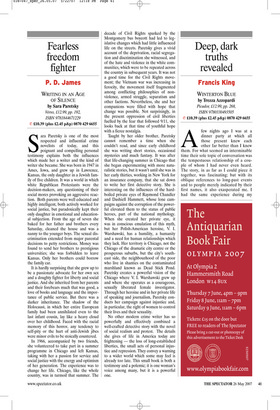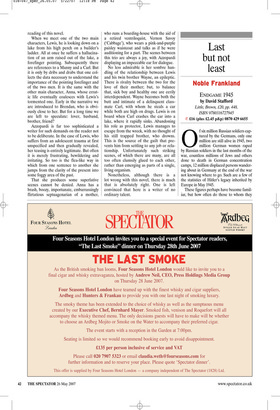Deep, dark truths revealed
Francis King
WINTERTON BLUE by Trezza Azzopardi Picador, £12.99, pp. 268, ISBN 9780330493505 ✆ £10.39 (plus £2.45 p&p) 0870 429 6655 Afew nights ago I was at a dinner party at which all those present knew each other far better than I knew them. For what seemed an interminable time their sole topic of conversation was the tempestuous relationship of a couple of whom I had never even heard. The story, in as far as I could piece it together, was fascinating; but with its oblique references to long-past events and to people merely indicated by their first names, it also exasperated me. I had the same experience during my reading of this novel.
When we meet one of the two main characters, Lewis, he is looking down on a lake from his high perch on a builder’s ladder. All at once he suffers a hallucination of an arm raised out of the lake, a forefinger pointing. Subsequently there are references to a Manny and a Carl. But it is only by dribs and drabs that one collects the data necessary to understand the importance of the pointing forefinger and of the two men. It is the same with the other main character, Anna, whose erratic life eventually coalesces with Lewis’s tormented one. Early in the narrative we are introduced to Brendan, who is obviously close to her. But for a long time we are left to speculate: lover, husband, brother, friend?
Azzopardi is far too sophisticated a writer for such demands on the reader not to be deliberate. In the case of Lewis, who suffers from an adolescent trauma at first unspecified and then gradually revealed, her teasing is entirely legitimate. But often it is merely frustrating, bewildering and irritating. So too is the flea-like way in which from one sentence to another she jumps from the clarity of the present into some foggy area of the past.
That she produces some superlative scenes cannot be denied. Anna has a brash, boozy, importunate, embarrassingly flirtatious septuagenarian of a mother, who runs a boarding-house with the aid of a retired ventriloquist, Vernon Savoy (‘Cabbage’), who wears a pink-and-purple paisley waistcoat and talks as if he were auditioning for a part. The scenes between this trio are always a joy, with Azzopardi displaying an impeccable ear for dialogue.
No less admirable is her sombre handling of the relationship between Lewis and his twin brother Wayne, an epileptic. There is rivalry between the two for the love of their mother; but, to balance that, sick boy and healthy one are eerily interdependent. Wayne becomes both the butt and intimate of a delinquent classmate Carl, with whom he steals a car while both are high on drugs. Lewis is on board when Carl crashes the car into a lake, where it rapidly sinks. Abandoning his role as protector, Lewis manages to escape from the wreck, with no thought of his still trapped brother, who drowns. This is the source of the guilt that prevents him from settling to any job or relationship. Unfortunately such striking scenes, of which there are many, are all too often clumsily glued to each other, rather than emerging as parts of a single, living organism.
Nonetheless, although there is a lot wrong with this novel, there is much that is absolutely right. One is left convinced that here is a writer of no ordinary talent.



















































































 Previous page
Previous page